Reshoring electronics manufacturing back to Europe
For many years, the electronics manufacturing industry was dominated by the appeal of low-cost offshore production, especially in China. Companies sought to maximize profits by leveraging the cost advantages offered by these regions. However, the tide is turning. A growing number of companies are reevaluating their offshore strategies and bringing their production processes back to Europe – a trend known as "reshoring."
Rising labor costs in China, supply chain disruptions caused by geopolitical tensions and the COVID-19 pandemic, and a renewed focus on sustainability have all exposed the vulnerabilities of overreliance on distant manufacturing locations. Companies now opt to reshore electronics production as a strategic solution to address persistent challenges within their global supply chains for electronic goods. The reasons presented by these companies for embracing reshoring are not only numerous but also compelling.
This article will discuss the compelling reasons behind this strategic shift. We will examine the advantages of reshoring, including improved supply chain resilience, enhanced quality control, faster response times to market demands, and the potential for innovation within closer proximity to European markets. Let's explore why companies should seriously consider bringing electronics manufacturing back to Europe.
What is electronics production reshoring?
Reshoring is the opposite of offshoring, which involves transferring production to cost-effective places abroad, usually where labor and manufacturing costs are cheaper. In contrast, reshoring refers to the strategic process of returning or moving the manufacturing of items (such as electronic devices) from other countries to the originator company's home country or a nearby site.
Over the years, offshore manufacturing has played a critical part in the global flow, with several European businesses establishing production facilities in countries such as China, Taiwan, and Vietnam, which are known for their lower labor costs.
This strategic choice can often be influenced by several circumstances, including a focus on product quality assurance, financial concerns, the requirement to reduce supply chain risks, and response to market dynamics. Reshoring seeks to strengthen local economies and industries by focusing on domestic manufacturing. Essentially, it refers to transferring value chain operations that were previously offshored back to the European Union, which represents a large potential source of new manufacturing jobs in Europe.
How does reshoring work?
While the specifics of reshoring vary across industries, the process of moving electronics manufacturing back to Europe generally follows these key stages:
- Feasibility Analysis: Companies meticulously evaluate factors such as labor costs, quality management, and the need for market responsiveness. They weigh the potential increase in labor costs against the anticipated savings in transportation, tariffs, and other logistical expenses.
- Strategic Planning: A comprehensive reshoring plan is developed, detailing the transition timeline, resource allocation, and potential facility requirements (new or reconfigured). This stage ensures a smooth and well-coordinated shift.
- Operational Setup: Companies may need to establish new facilities or retool existing ones to accommodate the reshored operations. Quality standards must be established and maintained at levels equal to or exceeding those achieved during offshore production.
- Talent Acquisition and Training: The necessary labor force is either hired or existing employees are retrained to meet the demands of the reshored operations.
- Overcoming Challenges: Companies must be prepared to address unforeseen challenges that may arise during the reshoring process. Proactive problem-solving and flexibility are crucial for success.
- Continuous Improvement: Ongoing monitoring and evaluation of the reshored operation are essential. Adjustments are made as needed to optimize performance and maximize the benefits gained from bringing production processes back home.
Why companies consider reshoring their operations: 7 push and pull factors
Several factors are compelling companies to reconsider their reliance on overseas production and explore reshoring their electronics manufacturing operations back to Europe. These factors can be broadly categorized into "push" and "pull" factors.
Push factors (motivating companies to leave offshore manufacturing):
- Rising costs: While traditionally seen as an advantage, production process costs in offshore Chinese companies are rising due to factors like increased wages, improved living standards, and trade war. Additionally, shipping costs (that is offshore transport expenses) have soared due to global competitiveness, further eroding the cost-effectiveness of offshore production.
- Supply Chain risks: The COVID-19 pandemic exposed the vulnerabilities of complex global supply chains. Factory shutdowns, port congestions, and geopolitical tensions are creating disruptions that threaten production and delivery timelines. Reshoring to the home country offers greater control of the supply chain and reduces dependence on foreign companies in distant locations, providing risk mitigation.
- Quality control concerns: Managing quality in offshore manufacturing can be challenging due to communication barriers, cultural differences, and potentially lax regulations. Reshoring allows closer oversight and ensures adherence to stricter quality standards.
- Intellectual Property (IP) protection: Concerns regarding intellectual property theft are driving some companies to reshore, especially those dealing with sensitive technologies. This allows them to better protect intellectual property like designs and innovations.
- Geopolitical instability: Political tensions, potential sanctions, and unforeseen policy changes can disrupt the overseas distribution process and foreign investment. Reshoring offers a more predictable political environment.
Pull factors (attracting companies back to Europe):
- Proximity to market: Reshoring production closer to European markets is cost-effective in terms that it reduces lead times, offers lower costs of transportation, and improves responsiveness to customer demands. Having production near the market enables swift adaptations and timely deliveries to address evolving demand. Also, Reduced shipping costs occur when both raw materials and finished products have shorter distances to travel.
- Enhanced control and Supply Chain Management: With production closer to home, companies gain greater control over their supply chains and production processes. This enables them to be more agile and adapt to changing market demands, unexpected surges in demand, and avoid hidden costs.
- Skilled workforce availability: Europe boasts a skilled workforce with relevant experience in electronics manufacturing. Companies can leverage this skilled talent pool to support their electronics product reshoring operations.
- Government incentives: Many European governments are actively supporting reshoring electronics production through initiatives like the European Chips Act, offering financial incentives like tax breaks and subsidies to make reshoring a more attractive destination or option for businesses.
- Sustainability approach to manufacturing: Moving manufacturing back home can help companies reduce their carbon footprint by shortening transport distances and potentially giving them better control over their environmental impact. Additionally, European countries often have stricter environmental regulations which may align with a company's sustainability goals.
- Effective communication: Reshoring facilitates smoother communication and collaboration between procurement teams due to shared time zones and cultural similarities. This can lead to faster problem-solving and improved efficiency.
- Value of goods: Perception plays a role in consumer purchasing decisions. "Made in Europe" labels can sometimes hold higher value in certain markets, potentially commanding premium prices.
- Strengthening local economy:
Reshoring manufacturing boosts the local economy by creating jobs, stimulating investment, and increasing tax revenue. This can create a ripple effect, benefiting local businesses and communities.
VECTOR BLUE HUB: Your trusted partner in reshoring electronics manufacturing
At VECTOR BLUE HUB, we understand the complexities of reshoring electronics manufacturing. With our extensive experience and expertise in electronic manufacturing services (EMS), we can help you navigate the process seamlessly and bring your production back home.
We offer a comprehensive range of services to support your entire reshoring journey, from feasibility analysis and planning to production setup and ongoing support. Our team of dedicated professionals will work closely with you to ensure a smooth transition and successful outcome. Our "Under One Roof" concept streamlines the process, eliminating the need for multiple vendors and saving you time and resources.





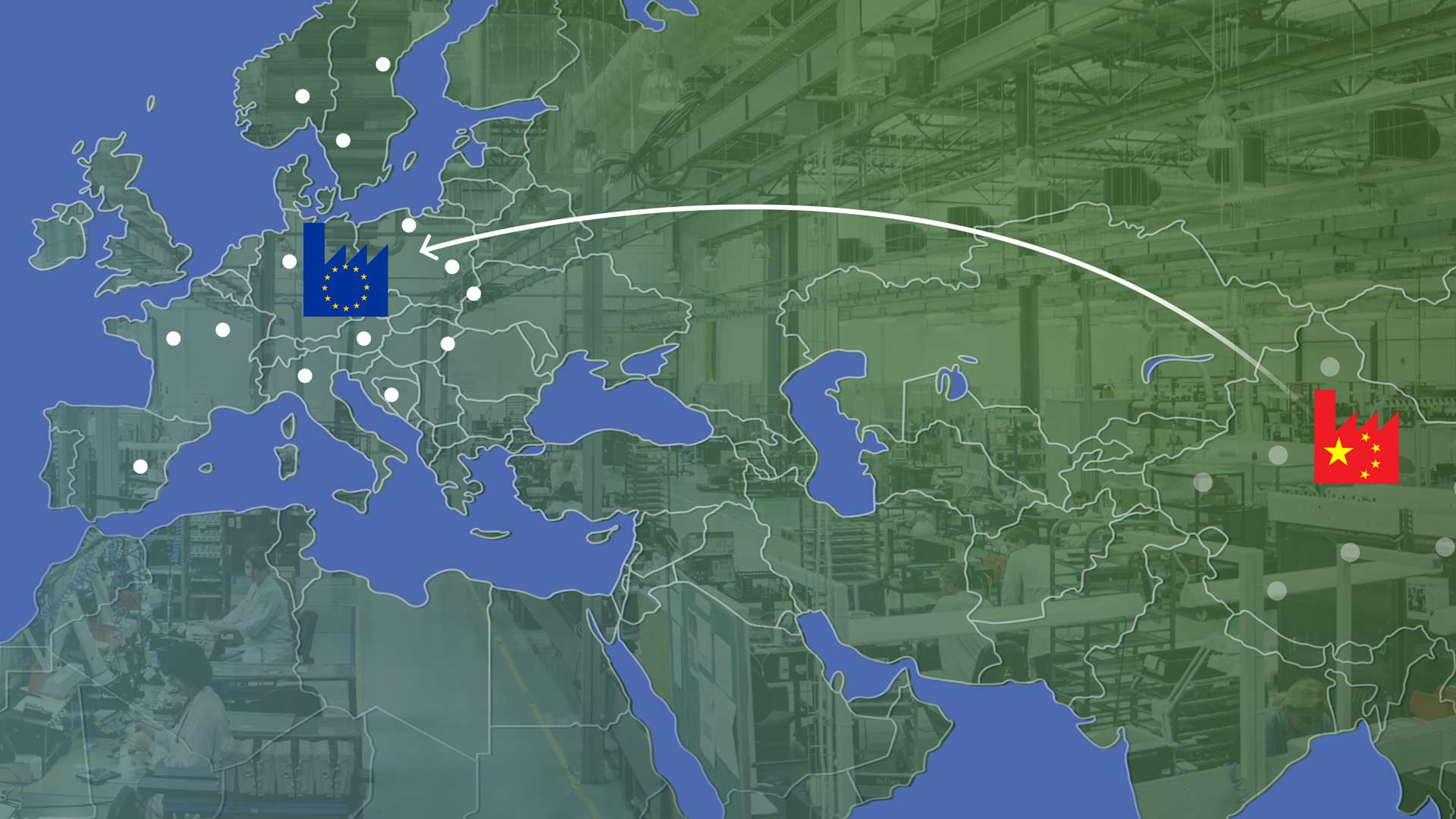

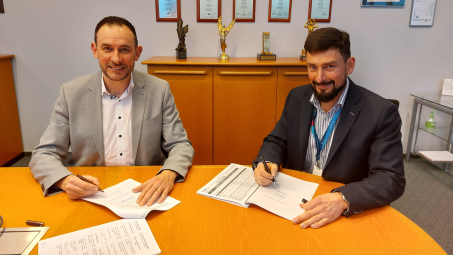
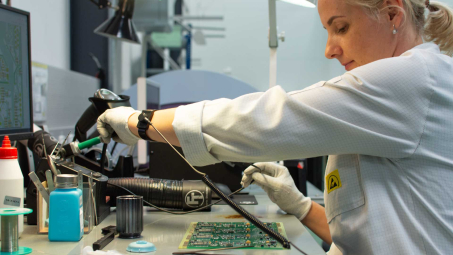
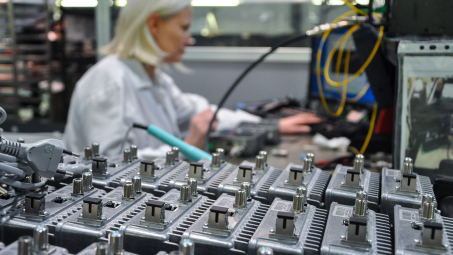
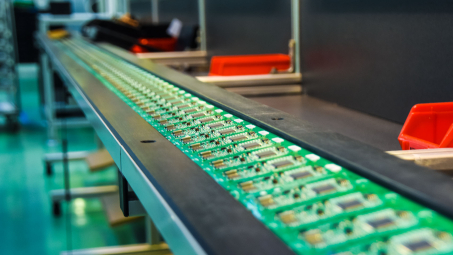
Aneta Radecka-Bonja
Aneta absolutely loves working with people and building relationships with them as it generates positive energy within her. As a highly skilled professional, she knows that no single approach is right for every individual, and so she always creates win-win situations when dealing with customers’ needs and expectations. Privately, she is crazy about Latin dance and culinary art.